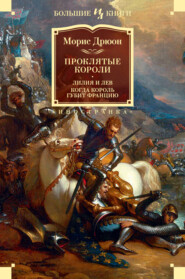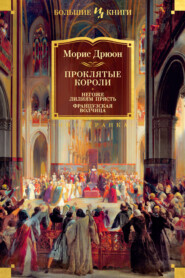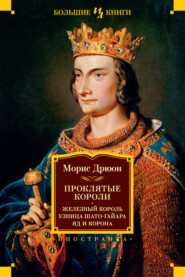По всем вопросам обращайтесь на: info@litportal.ru
(©) 2003-2025.
✖
The Lily and the Lion
Автор
Год написания книги
2019
Настройки чтения
Размер шрифта
Высота строк
Поля
At last the Count of Flanders moved from his place, came to a halt in front of the King, bowed and said: ‘Sire, if Louis of Nevers had been called, I would have come forward sooner.’
‘What do you mean, Monseigneur?’ replied Philippe VI. ‘Are you not Count of Flanders?’
‘Sire, I bear the name but do not enjoy its benefit.’
Philippe VI, looking as kingly as possible, drew himself up, turned his long nose towards the Count, and said calmly with a blank stare: ‘What is this you’re telling me, Cousin?’
‘Sire,’ replied Louis of Nevers, ‘the people of Bruges, Ypres, Poperinghe and Cassel have turned me out of my fief and no longer consider me to be their count and suzerain; indeed, the country is in such a state of rebellion that I can scarcely go to Ghent even in secret.’
Philippe of Valois slapped the arm of the throne with his wide palm in a gesture he had unconsciously adopted from having seen his uncle, Philip the Fair, the incarnation of majesty, make use of it so often.
‘Louis, my dear cousin,’ he said – and his stentorian voice seemed to roll out of the choir and over the congregation – ‘we look on you as Count of Flanders and, by the holy anointing and sacrament we receive today, promise that we shall know neither peace nor rest till you are restored to the possession of your county.’
Louis of Nevers fell on his knees and said: ‘Sire, I thank you.’
The ceremony then proceeded.
Meanwhile Robert of Artois was winking at his neighbours, and they at once realized that the scene had been previously arranged. Philippe VI was keeping the promises Robert had made on his behalf to assure his election. And, indeed, Philippe of Evreux was that very day wearing the crown of King of Navarre.
As soon as the ceremony was over, the King summoned the peers and the great barons, the princes of his family, and the lords who had come from beyond the boundaries of his realm to attend his coronation and, as if the matter could not suffer an hour’s delay, consulted with them as to the timing of an attack on the Flanders rebels. A valiant king was in duty bound to defend the rights of his vassals. A few of the more prudent spirits, in view of the fact that the season was already far advanced and that there was a risk of not being ready till the winter – they still remembered Louis the Hutin’s ‘Muddy Host’ – counselled him to postpone the expedition for a year. But the old Constable Gaucher cried shame on them: ‘For him who has the heart to fight the time is always ripe!’
He was now seventy-eight and eager to command his last campaign; and it was not for shuffling of this sort that he had agreed to surrender Charlemagne’s sword.
‘And the English, who are at the back of the rebellion, will be taught a lesson,’ he muttered.
After all, in the romances of chivalry you could read of the exploits of eighty-year-old heroes still capable of unhorsing an enemy in battle and cleaving his helm to the skull. Were the barons to show less valour than this aged veteran who was so impatient to set off to war with his sixth king?
Philippe of Valois rose to his feet and cried: ‘Whoever loves me well will follow me!’
It was decided to mobilize the army at the end of July and, as if by chance, at Arras. It would give Robert an opportunity to sow a little discord in his Aunt Mahaut’s county.
They moved into Flanders at the beginning of August.
The fifteen thousand citizen soldiers of Furnes, Dixmude, Poperinghe and Cassel were commanded by a burgess named Zannequin. Wishing to show that he knew the proper usages, Zannequin sent the King of France a challenge praying him to fix the day of battle. But Philippe felt nothing but contempt for this clodhopper who assumed the manners of a prince and made answer that since the Flemish had no true leader, they would have to defend themselves as best they could. Then he sent his two marshals, Mathieu de Trye and Robert Bertrand, who was known as ‘the Knight of the Green Lion’, to burn the country round Bruges.
The marshals were highly congratulated when they returned; everyone was delighted to see flames rising from poor people’s houses in the distance. The knights discarded their armour and wearing sumptuous robes visited each other’s tents, dined in pavilions of embroidered silk, and played chess with their friends. The French camp looked just like King Arthur’s in the picture books, and the barons thought of themselves as Lancelot, Hector or Galahad.
And so it happened that the valiant King, who preferred to be forearmed rather than forestalled, was at dinner when the fifteen thousand Flemish attacked his camp, carrying banners on which they had painted a cock and written:
Le jour que ce coq chantera
Le roi trouvé ci entrera.
In a very short time they had ravaged half the camp, cut the ropes supporting the pavilions, upset the chessboards, overset the banqueting tables and killed a good number of lords.
The French infantry fled; in their panic they never stopped to draw breath till they had reached Saint-Omer forty leagues to the rear.
The King had barely time to don a surcoat bearing the arms of France, cover his head with a basinet of white leather and jump on his charger to try and rally his heroes.
Both sides in this battle committed grave errors through vanity. The French knights had despised the commonalty of Flanders; but the Flemish, to show they were as much warriors as the French lords, had equipped themselves with armour to attack on foot.
The Count of Hainaut and his brother, Jean, whose lines stood a little apart, were the first to get to horse and disorganize the Flemish attack by taking the enemy in the rear. Then the French knights, rallied by the King, hurled themselves on the foot-soldiers, who were so heavily overburdened by their arrogant equipment, overset them, trampled them down and massacred them. The Lancelots and Galahads were content to club and slash, leaving it to their men-at-arms to finish off the wounded with daggers. Those who tried to flee were tumbled over by the charging horses; and those who offered to surrender immediately had their throats cut. The Flemish left thirteen thousand dead on the field, a fabulous heap of flesh and steel; grass, armour, man and beast were all sticky with blood.
The Battle of Mont Cassel, which had begun in so disastrous a way, ended in total victory for France. People talked of it as another Bouvines.
But the real victor was not the King, nor even the old Constable Gaucher, though he had shouted the names of his banners loudly enough, nor Robert of Artois, though he had fallen on the enemy ranks like an avalanche. The man who had saved the day was Count Guillaume of Hainaut. But it was Philippe VI, his brother-in-law, who reaped the glory.
So powerful a king as Philippe could not tolerate any omission on the part of his vassals. He therefore sent a summons to the King of England, Duke of Guyenne, to come to render homage to him without delay.
There are no advantageous defeats, but there can be disastrous victories. Few days in France’s history have cost her so dear as Cassel, for it gave currency to a number of false ideas, such as that the new King was invincible, and that foot-soldiers were worthless in war. The defeat of Crécy, twenty years later, was the consequence of this illusion.
In the meantime, the commanders of banners and the bearers of lances, even to the youngest squire, looked down from their saddles in contempt at the inferior species who fought on foot.
That autumn, towards the middle of October, Madame Clémence of Hungary, the unlucky Queen who had been Louis the Hutin’s second wife, died at the age of thirty-five in the Temple, where she lived. She left so many debts that, a week after her death, everything she possessed, rings, crowns, jewels, furniture, linen and plate, even her kitchen utensils, were auctioned on behalf of her Italian creditors, the Bardi and the Tolomei.
Old Spinello Tolomei, now very fat and lame, one eye open and the other shut, attended the sale. Six goldsmith-valuers, commissioned by the King, had fixed the reserves. Everything Queen Clémence had been given during her one year of illusory happiness was dispersed.
For four successive days the auctioneers, Simon de Clokettes, Jean Pascon, Pierre de Besançon and Jean de Lille, were to be heard crying: ‘A fine gold hat,
containing four balas rubies, four large emeralds, sixteen small balas rubies, sixteen small emeralds and eight Alexandraian rubies, six hundred livres! Sold to the King!’
‘A ring, with four cut sapphires and one cabochon, forty livres! Sold to the King!’
‘A ring, with six oriental rubies, three cut emeralds and three emerald brilliants, two hundred livres! Sold to the King!’
‘A silver gilt bowl, twenty-five goblets, two platters and a dish, two hundred livres! Sold to Monseigneur of Artois, Count of Beaumont!’
‘A dozen silver-gilt goblets, enamelled with the arms of France and Hungary, a great silver-gilt salt supported by four monkeys, four hundred and fifty livres! Sold to Monseigneur of Artois, Count of Beaumont!’
‘A gold-embroidered purse, sewn with pearls, containing an oriental sapphire, sixteen livres! Sold to the King!’
The Bardi company bought the most expensive lot: a ring containing Clémence’s largest ruby, which was estimated to be worth one thousand livres. They did not, however, have to pay for it, since it would be placed against her account with them, and they were sure of being able to resell it to the Pope who, having long been in their debt in the past, was now fabulously rich.
Robert of Artois, as if to prove that he was not solely concerned with goblets and drinking-vessels, acquired a Bible in French for thirty livres.
The chapel vestments, tunics and dalmatics were bought by the Bishop of Chartres.
A goldsmith named Guillaume le Flament acquired the dead Queen’s eating-utensils for a modest price; among them was a fork, the first ever to be made in the history of the world.
Her horses went for six hundred and ninety-two livres. And Madame Clémence’s coach together with that of her ladies-in-waiting were also auctioned.
And when at last everything was removed from the Temple, people had the feeling that an ill-omened house had been shut up.
Indeed, it seemed, that year, as if the past were wiping itself out of its own accord to make way for the new reign. The Bishop of Arras, Thierry d’Hirson, Countess Mahaut’s chancellor, died in the month of November. He had been the Countess’ adviser for thirty years, her lover too, for that matter, and had served her in all her intrigues. Mahaut was become very lonely now. Robert of Artois had a priest called Pierre Roger, who was a supporter of the Valois party, appointed to the diocese of Arras.
Things were going against Mahaut, while Robert seemed to be prospering in every way; his influence was continually increasing, and he was rising to the highest honours.
In the month of January, 1329, Philippe VI made the County of Beaumont-le-Roger a peerage; at last Robert was a peer of France.

















